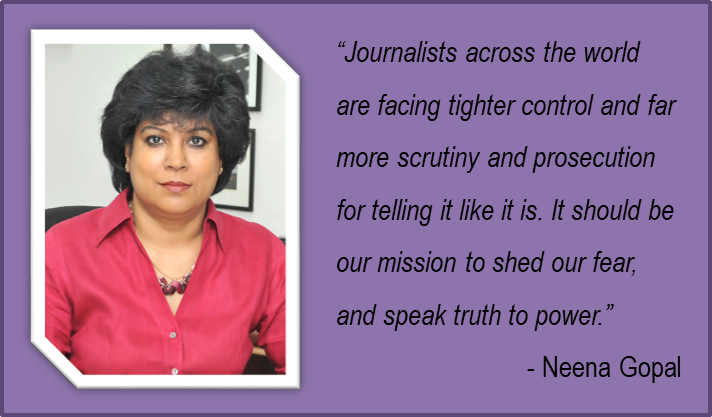Neena Gopal is a journalist who began her career in Bengaluru , right after the defining years of the Emergency. She went on to work with the Dubai based Gulf News for more than 20 years, until she returned to India and helped launch and run Deccan Chronicle in Bengaluru from 2008-2020. Author of ‘The Assassination of Rajiv Gandhi’, she speaks to Sameera Fernandes on the positive influencers that shaped her personal and professional life.
The early years seem to have had a considerable influence on your upbringing. What experience most shaped who you are today?
When you come from a family which routinely tuned into the radio, had politically charged discussions at the dinner table, and kept very well informed of current events, it changes you. Especially in our ancestral home in Kerala where grandparents, uncles and cousins of various political persuasions argued about everything. My strict parents’ only indulgence was letting me buy all the books I wanted. My favourite haunts in Delhi were the USIS, the British Library and a second hand bookstore in Shankar Market. Imagine my joy when I found the British Library when we moved to Bangalore. Our entire lives revolved around books. To a great extent, it contributed to what I am today.
What drives you?
I have always wanted to find the story behind the story, I’m never satisfied with the obvious. This is what drives me. When I was in Saudi Arabia and Kuwait, the only Indian woman journalist covering the Iraqi invasion of Kuwait, I remember that when I heard that the Iraqi generals were going to surrender, I took off immediately. We drove across the Kuwaiti border through the Iraqi desert to Basra, to watch U.S. General Norman Schwarzkopf accept the Iraqi surrender. In Baghdad, I wanted to see first hand what the children of Basra faced during chemical attacks by Saddam. In Jaffna and Killinochchi I saw the plight of the Tamils. To be on the frontlines, and sense danger and excitement gives you an adrenaline rush. I’m always asked why I chose to cover wars and didn’t think twice about covering conflict zones. But I believe that comes with the territory. And I was never afraid. You have to live in the moment!
A very interesting career indeed! What ignited that spirit in you?
I always knew I would be a writer, but journalism and chasing stories gave my writing an edge. And in the early eighties, I was lucky to be in a country like the UAE, which was coming of age, and where fortuitously, I always seemed to be in the ‘wrong ‘ place at the right time! It was the city which attracted the rich and the powerful from across the globe. So I got to interview everyone from Bjorn Borg and Imran Khan to Nawaz Sharif and Abdulla Abdulla! The newspaper I worked in, was also a melting pot of cultures. There were Indians, Sri Lankans, Pakistanis, Brits, and Arabs. It was a huge learning experience. And none of us were defined by our gender, race, or religion.
Your experience at Gulf News seems to have left you with cherished memories. What were some of the highlights of the work environment that encouraged you to scale greater heights?
There are many instances that I treasure. My colleagues and the management were like family. We all looked out for one another. In 1991, when I was readying to cover the First Gulf War, the chairman of Gulf News handed me the company’s first laptop. Nobody had even heard of one, at that time. And in 2001, when I was heading to Afghanistan, Mr Obaid Al Tayer handed me a Thuraya satellite phone. It was the only mode of communication. I used to sit out in the cold in Kabul, and dictate my stories to our office in Dubai! In Baghdad, just before the fall of Saddam Hussain, the Iraqis charged me a hundred dollars a day for that phone!
You were one of the last journalist to meet India’s youngest Prime Minister moments before his dreadful assassination. Please share your experience.
Rajiv Gandhi was an extremely perceptive man. He was no longer a political novice. I spent 45 minutes with him in his car, earning the dubious honour of being the last journalist he spoke with, before he was blown up by the world’s first suicide bomber, right before my eyes. 30 years later, it still strikes me how close I was. And that Rajiv Gandhi knew he was a target, and said as much. I can still hear his voice in my head, saying “haven’t you noticed how every single South Asian leader of any import has been assassinated, look at Mrs. Gandhi, at Zia ul Haq, at Sheikh Mujib.”
What is your message to young people ?
Journalists across the world are facing tighter control and far more scrutiny and prosecution for telling it like it is. It should be our mission to shed our fear, and speak truth to power. We must be the conscience of our nation and as difficult as it may be, stand up for truth and for what we believe in.
The views and opinions published here belong to the interviewer and the interviewee and do not necessarily reflect the views and opinions of the publisher.



Be the first to comment on "Straight Talk with Neena Gopal"